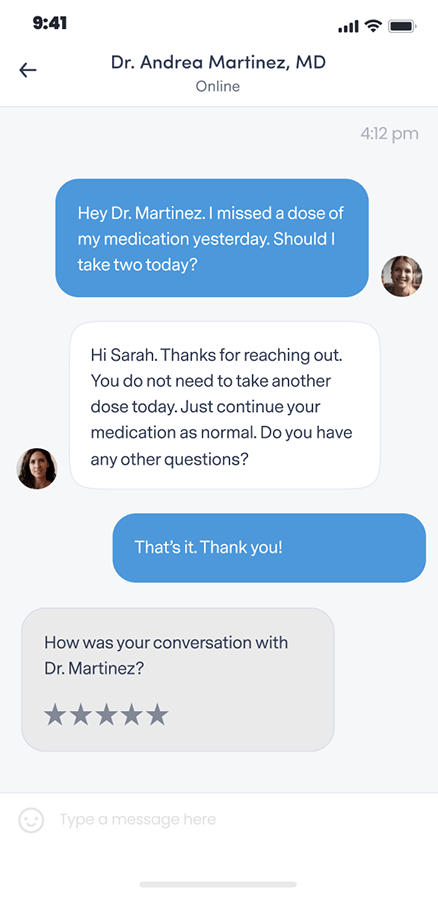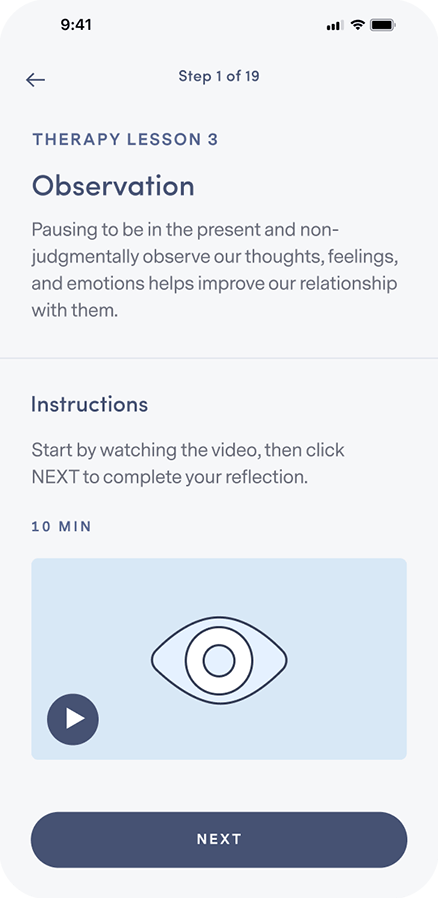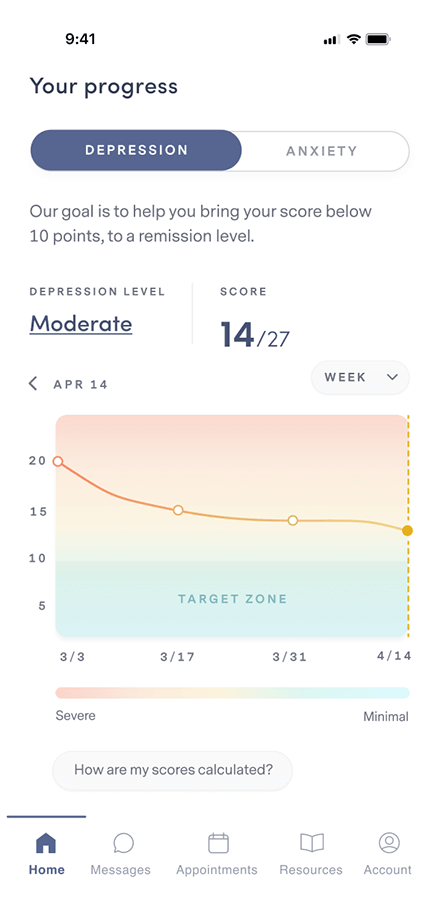Member Spotlight: Chelle’s Story
Mental illness affects people just like me. Mental illness affects people different from me. You can’t just “snap out of it.” And it’s...
HOW WE TREAT SOCIAL ANXIETY
Our providers understand the challenges of social anxiety, and have real-world experience helping people just like you.
Start with a free assessment
Our Care
Different people experience social anxiety in different ways. That’s why our providers work 1:1 with you to personalize treatment to your unique needs.
When medication is necessary, our psychiatric providers analyze 100+ data points to determine the most tolerable and effective prescription for you.
Our program combines cognitive and behavioral therapy with independent skill practice—all of which have been clinically proven to work for a wide range of symptoms.
Mental Health condition
People suffering from social anxiety disorder feel fear, anxiety and exhibit avoidance behaviors, which interfere with their daily routine, work, school, or other activities.

Social anxiety disorder is not the same as being shy. Social anxiety disorder is a mental health condition marked by an intense, persistent fear of being watched and judged by others. Research suggests that about 7% of Americans suffer from social anxiety disorder.
This fear can affect work, school, and other day-to-day activities. Social anxiety disorder can even make it difficult to create and maintain friendships or relationships with others.
People with social anxiety disorder are also at an increased risk for developing major depressive disorder and alcohol use disorders.
However, there is hope. Social anxiety disorder doesn’t have to stop you from reaching your full potential. With treatment, you can overcome your symptoms.

People with social anxiety disorder often expect the worst possible consequences from a negative experience during a social situation, and avoid doing things or speaking to people out of fear of embarrassment.
HOW IT WORKS

Let your provider know how you’re feeling, get to know you, and provide 1:1 support.

Get questions or concerns off your chest between video visits by messaging your provider at any time.

Learn how to integrate new thought and behavior patterns into your daily life.

Complete weekly check-ins so your provider can track your progress and, if necessary, adjust your treatment and/or medication.
Our plan options
Because quality mental health care shouldn’t be out of reach for anyone.
PERSONALIZED
clinically-proven
comprehensive
Free Assessment
86% of our members feel better within 12 weeks.
We accept insurance.





FREQUENTLY ASKED QUESTIONS
If your question isn’t answered below, view our full list of FAQs here.
Brightside is available to people 18 years and older in the states where Brightside operates who believe they may be experiencing depression and may benefit from treatment.
Remote care is not a good fit for people with certain conditions or situations. These include (but are not limited to):
Our providers do not treat, and do not prescribe for adhd.
If any of these describe you, it’s best for you to be seen by a provider in person so you can get the care that’s right for you.
Brightside makes it easy to get top quality depression care from the privacy of home.
Here’s how Psychiatry works:
Here’s how Therapy works:
When scheduling your first appointment, you can browse all of our available providers in your state. Take a look at their profiles and check open times to find the best fit for you. Every Brightside provider undergoes a rigorous hiring and vetting process to ensure the highest quality care.
Brightside currently accepts select insurance plans in various states for payment of your provider’s or therapist’s services. Please see below for a current listing of plans. Brightside may not be included in all plans that each health insurance company offers. Please contact your health insurance plan to verify that your care at Brightside will be covered.
We currently accept the following insurance plans:
If you are a new member signing up for services you can enter your insurance information during the sign-up process. We’ll let you know your eligibility, as well as you estimated co-pays and out-of-pocket costs (if any) before signing-up or scheduling.
We also accept HSA/FSA payment if you have one of those accounts. If you have questions about using your medical or prescription insurance benefits, please contact us by emailing [email protected].
A medical professional will diagnose social anxiety disorder if you experience marked and persistent fear of one or more social or performance situations in which you are exposed to unfamiliar people or possible scrutiny by others. This fear must persist for six months or more.
Additionally, the avoidance, anxious anticipation, or distress in the feared situation may interfere significantly with your regular routine, job or school performance, and social activities or relationships. Seeking help from a mental health professional is the first step to feeling better.
Some risk factors may contribute to the development of social anxiety disorder. These include:
Biological factors: You’re more likely to develop social anxiety disorder if your biological parents or siblings have the condition.
Negative life experiences: People who experience teasing, bullying, rejection, ridicule, or humiliation as children may be more prone to social anxiety disorder. Other adverse events in life, such as family conflict, trauma, or abuse, may also be associated with social anxiety disorder.
Temperament as a child: Children who are shy, timid, withdrawn or restrained when facing new situations or people may be at greater risk of developing social anxiety disorder as they get older.
Social or work demands: Social anxiety disorder symptoms typically start during the teenage years, but meeting new people, giving a speech in public, or presenting an important project at work may trigger symptoms for the first time.
Having a condition that draws attention: Disfigurement, stuttering, or tremors due to Parkinson’s disease, for example, can increase feelings of self-consciousness and may trigger social anxiety disorder in some people.
If your symptoms become so extreme that they disrupt daily life and significantly interfere with daily routines, job performance, or your social life, it may be time to seek professional help.
If you’re suffering from social anxiety disorder, the symptoms can wreak havoc on your life. Social anxiety disorder may cause you to decline a job opportunity that requires frequent interaction with new people. Or, you might avoid going out to a restaurant with friends because you’re afraid that your hands might shake when eating or drinking.
If your symptoms become so extreme that they disrupt daily life and significantly interfere with daily routines, job performance, or your social life, it may be time to seek professional help.
Social anxiety disorder can be treated with medication, therapy, or a combination of the two. The best outcomes are often achieved with a combination of treatments.
Medication
Medication is an effective form of anxiety treatment for many people. Medications commonly prescribed for social anxiety disorder include selective serotonin reuptake inhibitors (SSRIs) and norepinephrine-dopamine reuptake inhibitors (NDRIs). Common examples include Sertraline (Zoloft), Escitalopram (Lexapro), and Bupropion (Wellbutrin). There are other categories of medications that are used as well. Have a conversation with your doctor to figure out if medication is the right treatment option for you.
It typically takes at least two to six weeks of taking medication to see improvement. It may also take several trials to find the medication that works best. Once the right medication is found, dosage may be adjusted to optimize results.
Brightside offers medication plans to treat social anxiety disorder. Click here to learn more about our medication plan offerings.
Therapy
Cognitive behavioral therapy (CBT) is the most effective type of psychotherapy for social anxiety disorder. It can be equally effective when conducted individually or in groups.
In exposure-based cognitive behavioral therapy, you gradually work up to facing the situations you fear most. Doing this can improve your coping skills and help you develop the confidence to deal with anxiety-inducing situations.
You may also participate in skills training or role-playing to practice your social skills and gain comfort and confidence relating to others in social situations. Practicing exposure to social situations is particularly helpful to challenge your worries and fears.
Self-Care, Coping, and Support
Several techniques and lifestyle changes can help mitigate the symptoms of social anxiety disorder.
Don’t wait to seek help: Symptoms of social anxiety disorder, like other mental health conditions, may not improve on their own. Getting help early may be key to feeling better, faster.